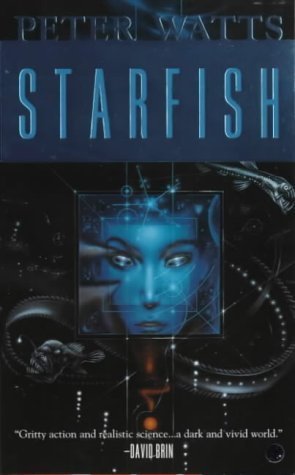Starfish (Rifters #1) Peter Watts
 Starfish is Peter Watts' first novel and it shows. It starts as something and transforms into something else, to then turn into a series, possibly because of publisher pressure. That doesn't make it less captivating, bleak and capable of getting under your skin and stick there; a fantastic debut.
Starfish is Peter Watts' first novel and it shows. It starts as something and transforms into something else, to then turn into a series, possibly because of publisher pressure. That doesn't make it less captivating, bleak and capable of getting under your skin and stick there; a fantastic debut.
The story seems to be about societal rejects being more or less forced to choose to life on the bottom of the ocean, handling gigantic geothermal power stations which feed the never ending hunger for energy on the surface. These people are weird, yucky and very damaged.
The main character is a victim of abuse that gets off on getting abused, surrounded by people like pedophiles, bullies, murderers, violent criminals and so on that have to somehow work together. Sometimes it works, sometimes it doesn't work. However, slowly, being alone on the bottom of the ocean, surrounded by gigantic yet fragile monsters, she realizes she likes it, as do the others. Freed from the artificial pressures of society and surface environment, they almost turn into a different species.
Then the story changes subject with the interference of the surface people who just naturally assume they know better and driven by a terrible secret. That secret leads to some extreme events which... end the book and prepare sequels. Starfish does psychopathology, brain organelles, deep marine biology, claustrophobic tension, weird romance, social commentary, deep state politics and the banality of human evil.
Now, I don't think I want to read the rest of the series. By own admission from the author, this was a short story turned novel. I would rather reread the amazing Blindsight and maybe get to that book's sequel instead. However it was a fascinating story, being mostly uneventful, yet also never boring. How does Watts make that happen?
I will end with the most hilarious review, from Analog magazine:
Watts’s true enemy is human stupidity, the sort of thing that turns children into walking disaster zones, treats adults as interchangeable things, insists that unchecked fertility is a good thing, and blindly trusts that our artificially intelligent creations must share our priorities. As Watts develops that point, he tells an absorbing tale set in a bizarre world and hinging upon intriguing technology. He’s done his homework well, and it shows.
Comments
Be the first to post a comment